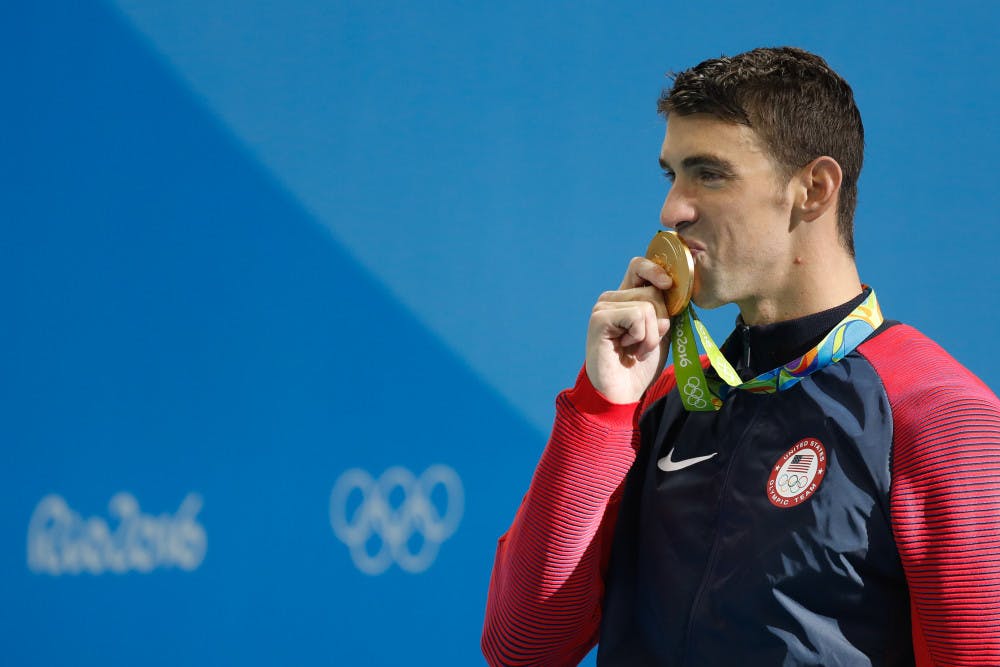Athletes are a lot like superheroes. Millions of people around the world watch sports and marvel at the seemingly otherworldly abilities of athletes. When you watch Serena Williams win her record-breaking 23rd Grand Slam title at the Australian Open while pregnant or Simone Biles defy gravity with her floor routine, it becomes increasingly easy to think of these incredible athletes as only that: athletes. But, because their abilities have projected them to celebrity, the human impulses of athletes are often questioned in interesting ways — like whether or not they should exercise the right to self-expression afforded to them by the Constitution. Sports as a form of entertainment distance athletes from their ability to be fully human. As such, we as a society need to reconsider how we see athletes: not as mere sources of entertainment, but as human beings.
I love sports. Watching people do what they do best is incredible from a fan’s perspective. You feel like you’re with your favorite team as you ride the rollercoaster of emotions, whether it’s the elation of a game-winning three pointer, the anger at a questionable yellow card, or the agony of blowing a 25-point lead. However, we’re presented with and consume sports in a way that allows us to define an athlete by their abilities, not by who they are as a person. I know that it’s not the responsibility of ESPN or Fox Sports to assert the fact that athletes are, in fact, human beings with thoughts and opinions. I like to hear commentators focus on the game or match they’re covering and offer expert analysis, nothing more and nothing less. But keeping the purpose and expectation of sports entertainment in mind, it’s important that we collectively remember that our favorite athletes are just like us in a lot of ways — capable of political opinions, vulnerabilities and errors in judgement.
Making athletes out to be superhuman is a nice sentiment and serves as a testament to their skill, but it also opens the door to unreasonable expectations. My fellow columnist Bryce Campanelli ’18 wrote a few weeks ago about why athletes deserve a political voice, arguing against the idea that athletes should just “stick to sports.” Sayings like this reflect the negligence I’m referring to — our inability to recognize that athletes are human. If a tennis player double faults to lose a break point to their opponent, it’s understandable if they get upset and break their racket out of frustration. Similarly, if an athlete is upset about what’s going on in their country and society as a whole, they should feel free to express this kind of frustration as well.
To be sure, athletes can make mistakes and engage in inappropriate behavior. That behavior should be criticized and punished accordingly. But if we expect athletes to be emotionless, hyper-competitive and devoted solely to their sport, we inhibit their ability to serve as role models and change agents — and, in the process, we hurt them. Athletes face a higher risk of depression and mental illness, partly because of the pressure to win. Take it from the greatest Olympian of all time, Michael Phelps, who nearly committed suicide three years ago. “For the longest time, I thought asking for help was a sign of weakness because that’s kind of what society teaches us,” he told USA Today. “That’s especially true from an athlete’s perspective. If we ask for help, then we’re not this big macho athlete that people can look up to.” The suffering of professional athletes trickles down to collegiate athletes, half of whom endure high levels of anxiety. Having to be a glorious, victorious athlete full-time isn’t just stressful — it can seriously harm your well-being.
International competition illustrates the positive role athletes can play in society when we free them from suffocating, narrowly defined expectations. Every four years, countries send their athletes to compete at the Summer and Winter Olympic Games. Politics aside, when your country experiences success, the whole nation can be brought together. Monica Puig won Puerto Rico’s first ever Olympic gold medal last summer, completing an improbable run to win the women’s singles in Rio de Janeiro. As part of the hurricane relief effort in Puerto Rico, Puig has raised more than $130,000 to help victims of the storm. If Puig heeded advice to “stick to sports,” she would have sat idly by as her home continued to suffer. Sometimes, there’s just no question that athletes should be active members in society — it’s absolutely necessary for them to get involved and not simply “stick to sports.”
Athletes are human. If you’re a fan of an athlete only until their existence makes you the least bit uncomfortable, you should question whether you’re truly a fan or just a spectator hungry for a win. There’s nothing wrong with disagreeing with the opinions of others. You don’t have to agree with the way some athletes might choose to live off the field, but that doesn’t mean they don’t deserve to have opinions and be complete people. We admire these people immensely, so why would we want to restrict them from participating in society as agents for change or making any kind of positive impact? Yet, that’s essentially what happens when we place unreasonable parameters on what athletes can or can’t do.
Quentin Thomas ’21 can be reached at quentin_thomas@brown.edu. Please send responses to this opinion to letters@browndailyherald.com and other op-eds to opinions@browndailyherald.com.





